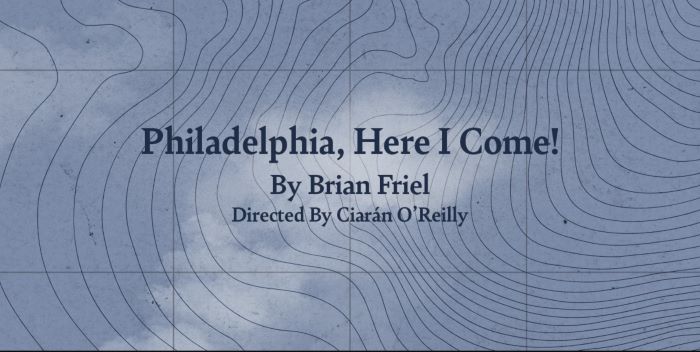Off-Broadway’s acclaimed Irish Repertory Theatre continues the celebration of its 35th season with Philadelphia, Here I Come!, the third mainstage production in The Friel Project, a retrospective on the work of Irish playwright Brian Friel (1929-2015). The 1964 dramatic comedy, set in the fictional town of Ballybeg in 1962, launched his international success and remains as relevant today as it was then, with its themes of the promise and pain of emigration, nagging internal conflicts, and a failure to communicate that make the decision to leave home as stressful as it is hopeful.
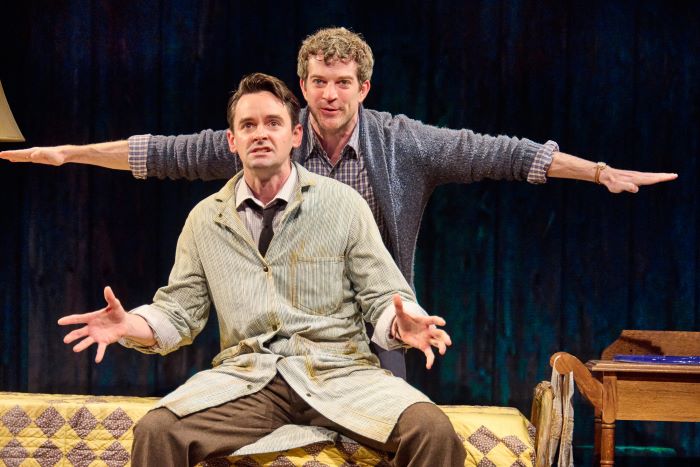
It’s the night before 25-year-old Gar O’Donnell’s scheduled departure from his family and friends to escape the tedium of their small village and his dead-end situation in Ireland to go live with his effusive Aunt Lizzy in Philadelphia and begin an exciting new life in America. Directed by Ciarán O’Reilly with a perfect combination of humor and poignancy, the story is heard from two distinct perspectives of the central character, embodied by two different actors: the guarded and reticent Gar (Public), who, with his combination of politeness and insecurity, hides his true feelings so as not to cause any issues or embarrassment; and Gar (Private), the outspoken uninhibited alter-ego in his mind, who bravely does and says whatever he thinks and feels, and encourages his outward self to do the same.
He doesn’t. Consequently, he loses his girlfriend Katie to a wealthy businessman when he lacks the confidence to ask Senator Doogan, her father (who thinks the working-class Gar is below them and prefers the other), for her hand in marriage – a hesitancy that leaves him heartbroken. And despite his second thoughts about starting over in a new country, the emotionally guarded Gar is unable to have an open and honest conversation with his even more uncommunicative father and boss S.B. (aka “Screwballs” to his son), though that’s all it would take for him to change his plans and stay.
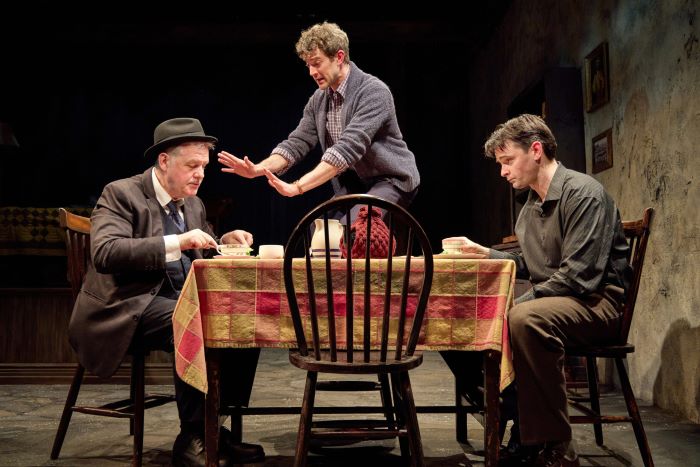
When Gar’s old teacher Master Boyle stops by the house, he wishes him well, then asks for some money to spend at the pub, and the parish priest Canon O’Byrne arrives for his nightly game of checkers with S.B. but does nothing to inspire him to vocalize his emotions to his son. A visit from Gar’s longtime friends Ned, Tom, and Joe, who head out quickly after a round of beer, further exacerbates the situation, when he finds out they didn’t come on their own but were invited for tea by the O’Donnells’ blunt and opinionated housekeeper Madge. She’s the only one who shows her love and concern for the boy she raised from infancy (after the death of his mother) and her exasperated disapproval of his father’s unspoken feelings and lack of acknowledgment of his son’s imminent exit, which she tries hard to elicit before it’s too late.
Will they make that long overdue connection? Will Gar have an attack of separation anxiety or pangs of nostalgia and stay? Or will he take his shabby packed suitcase, tied together with a rope, and begin the journey to Philadelphia?
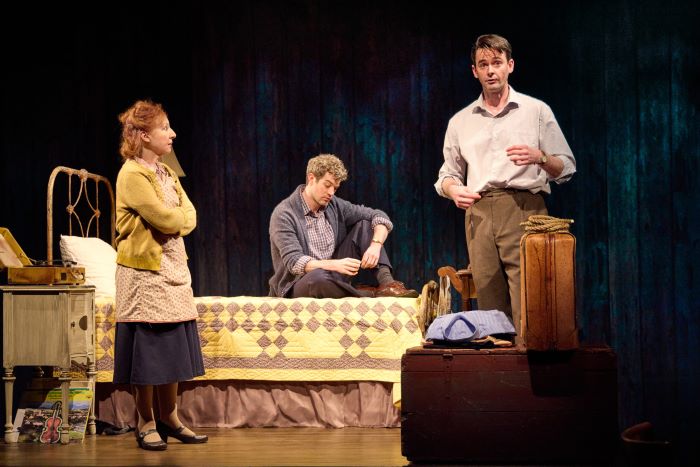
A superb cast delivers all the laughs, pain, and uncertainty, led by David McElwee’s heartrending portrayal of the sensitive, reserved, and diffident Gar (Public) and A.J. Shively’s sensational characterization of his unrestrained and spirited private side. It’s a pairing of opposites that works perfectly together, with split-second timing, rapid-fire interactions, and funny high-energy scenes (while alone in Gar’s bedroom) of dancing and flying, singing the titular line “Philadelphia, here I come!” (to the tune of the 1924 Al Jolson song “California, Here I Come”), imitating well-known American figures and assuming a variety of accents (cowboys and Elvis among them), as well as mastering the Irish brogue (dialect coaching by Jane Guyer Fujita). They also face off masterfully in their ongoing internal debates, memories, and approaches to the other characters, bringing to life Gar’s conflicted thoughts and suppressed emotions with believable psychology, intense feeling, and appropriate demeanors.
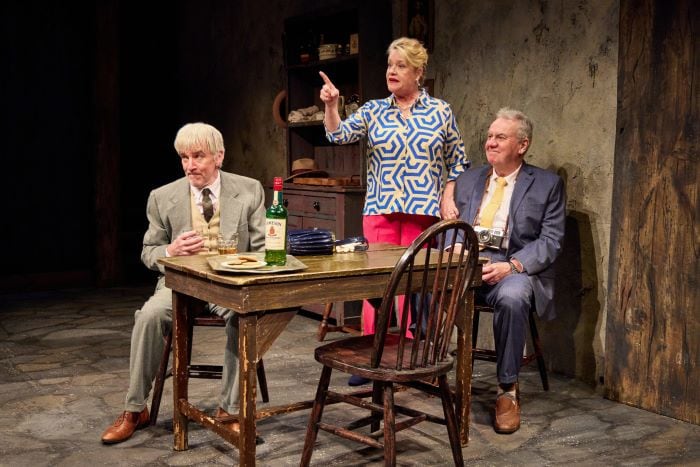
Joining them in impeccably performed featured roles are O’Reilly as Gar’s restrained father S.B., who embodies the traditional form of controlled, inexpressive, and unemotive masculinity; Terry Donnelly as Madge, who is the backbone of the household, a loving maternal presence for Gar, and a woman who has also experienced disappointment in her own family; Deirdre Madigan as Aunt Lizzy, who generates a whirlwind of ebullience, a little bit of forgetfulness, and a lot of affection for her nephew and excitement about having him come live with her in Philadelphia as the son she always wanted but never had; and Clare O’Malley as Katie, the love he let slip away, though she was sincere in her desire to marry him and bewildered by his decision not to entreat her father.
Rounding out the consistently fine ensemble are James Russell, Tim Palmer, and Emmet Earl Smith as Gar’s friends Ned, Tom, and Joe, who behave immaturely, don’t act particularly bothered by his move to America, but make small goodwill gestures upon their exit; Peter Cormican appearing in the Lizzy flashback segment as Ben; and Ciaran Byrne and Patrick Fitzgerald playing the dual roles of Senator Doogan and Canon O’Byrne, and Master Boyle and Con, respectively.
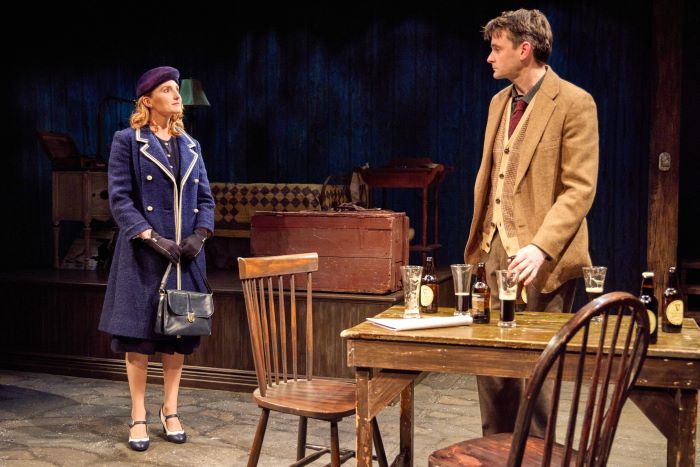
A period-style character-defining artistic design sets the stage for the story, in a modest interior with distressed walls, wooden furnishings, hand-stitched fabrics, and drinking glasses and bottles (set by Charlie Corcoran; props by Nicole Rozanski), attire that distinguishes the personalities and their stations (costumes by Orla Long; wigs and hair by Rachael Geier), and lighting (by Michael Gottlieb), sound and original music (by Ryan Rumery and M. Florian Staab) that enhance the changing moods of exuberance and expectation, isolation and anguish.
Along with this outstanding full-stage production, which is sure to garner multiple awards, The Friel Project includes a free Reading Series from the playwright’s extensive canon and an exhibition on Mapping the Land: The Literary Landscape of Brien Friel in the Irish Repertory Gallery on the second floor, opening on Monday, April 15, where you can learn more about the life and work of the playwright through his personal letters, photographs, manuscripts, and more.
Running Time: Approximately two hours and 10 minutes, including an intermission.
Philadelphia, Here I Come! plays through Sunday, May 5, 2024, at Irish Repertory Theatre, 132 West 22nd Street, NYC. For tickets (priced at $25-125, plus fees), call (212) 727-2737, or go online.
Before you go, you can watch the trailer below:


